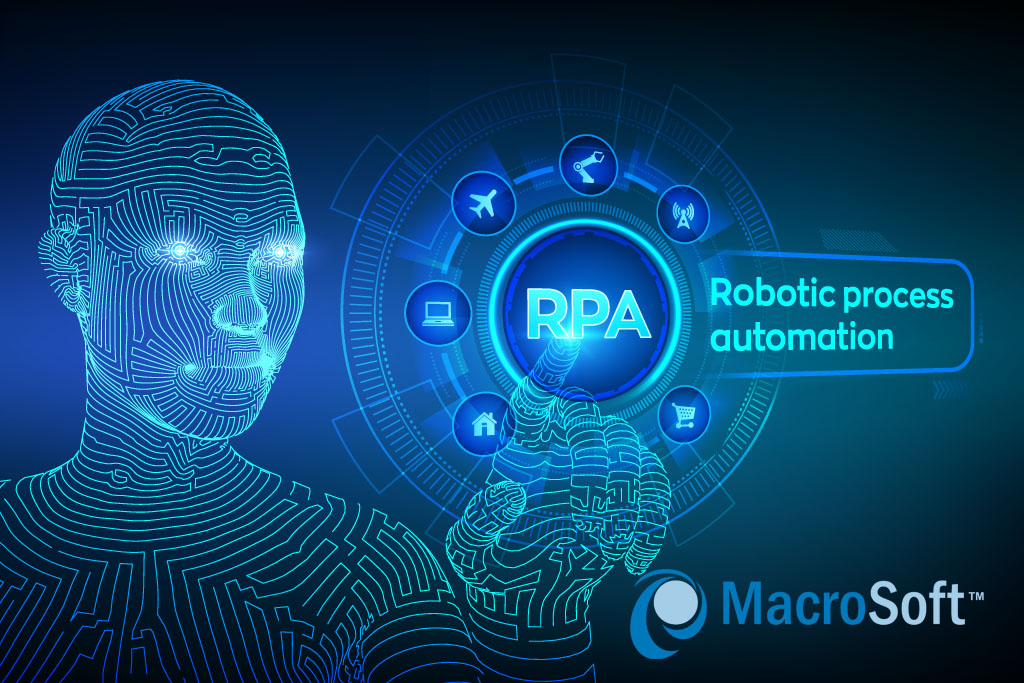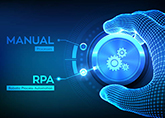

Robotic process automation (RPA) is a form of business process automation technology that makes it easy to build, deploy, and manage software robots that emulate humans’ actions interacting with digital systems and software. Just like people, software robots can do things like understanding what’s on a screen, completing the right keystrokes, navigating systems, identifying, and extracting data, and performing a wide range of defined actions. But software robots can do it faster and more accurately than people, without the need to take a coffee break.
Top 3 Business Benefits of RPA?
The advantages of RPA are numerous, including cost savings, reduced failure rates, faster efficiency, reduced turnaround time, increasing process scalability, and improved compliance. The top three business benefits Macrosoft has seen as an outcome from our RPA clients are.
- Speed & Efficiency – Shorter turnaround times, and ROI < 3 Months
- Cost savings – Reduction in Operational & Labor costs up to 75%,
- Improved Customer Service & Experience – Empowering Employees to serve the customers quickly and effectively
Why is RPA Transformative and where to implement?
Instead of people, software robots do repetitive and low-value tasks like as entering into applications and systems, moving files and directories, extracting, copying, and inserting data, filling out forms, and running regular analysis and reports. Advanced robots can even execute cognitive tasks such as deciphering language, participating in chats and conversations, comprehending unstructured data, and making complicated decisions using advanced machine learning models.
Humans are freed to focus on the things they do best and enjoy more when robots perform these types of repetitive, high-volume tasks: innovating, collaborating, creating, and interacting with customers. Businesses benefit as well, with increased production, efficiency, and resilience. It’s no surprise that RPA is changing the way we work.
RPA has grown in popularity due to its broad applicability. Virtually every high-volume, business-rules-driven, repeatable activity, as well as cognitive operations requiring higher-order AI skills, are excellent candidates for automation.
Why I should Consider RPA for my Business?
RPA can be considered with other technical options and with some process change management skills. Use cases for RPA include instances when an organization wants to work with structured data to Automate an existing manual task or process with minimal process re-engineering.
Improve speed, quality, and productivity RPA bots can be trained to undertake un-intelligent and repetitive tasks faster and more accurately than humans ever could. RPA helps organizations speed up processes while reducing costs, ensuring organizations are ready to deal with disruption and change.
Enterprises in multiple industries are benefiting from RPA by accelerating back-end processes. According to Office Worker Survey, conducted by UiPath, 67% of global office workers feel crushed by doing repetitive tasks. They would like to automate many of them, including e-mails, data input, creating datasets, scheduling calls and meetings.
Industries that require RPA
| Banking | Financial Services | Health Care | Retail |
|---|---|---|---|
| Bank Account Opening | Refund Processing | Patient registration scheduling | Invoice Processing |
| Reversal of Charges | Incentive claims | Claims management | In-Store Planning |
| Remittance Process | Collections | Medical Billing | Sales Analytics |
| Credit Card Processing | Statement Reconciliation | Appointment Scheduling | Business and Sales Analytics |
| Fraud Detection | Brokerage Processing | Customer Support | |
| Human Resources | Insurance | Manufacturing | Telecom |
|---|---|---|---|
| Resume Screening | Claims Processing & Clearance | Bill of Materials (BOM) | Customer Onboarding/ Offboarding |
| New employee joining formalities | Premium Information | Creating and filing invoices | Network Management |
| Offer letter administration | Form Registration | Invoice Data Capture | Debt collection |
| Payroll process | Regulatory Compliance | Order Booking Automation | |
| Secure Proof of Deliveries (PODs) | |||
The financial sector was one of the first industries to use robotic process automation, but today RPA software has an increasing role across many branches, including retail, construction, telecommunication, oil, gas, and energy, pharmaceutical, utilities, automotive, fashion, logistics, or food industry.
Macrosoft offers end-to-end RPA services, which include everything from evaluation and assessment to strategy, planning, deployment, and support. We’ve had a lot of experience helping small, medium, and large businesses automate and streamline their business processes, which has translated into enhancing productivity and efficiency.
By Suryagayathri C K | January 13th, 2022 | Process Automation
Recent Blogs


The Peril of Fake Job Candidates in the Technology and IT Industry
Read Blog

Humanizing Automation: Fostering Collaboration in the Digital Era
Read Blog

Advantages of Technology and IT Companies Partnering with Staffing Firms Offering Visa Sponsorship
Read Blog


 Home
Home Services
Services




































